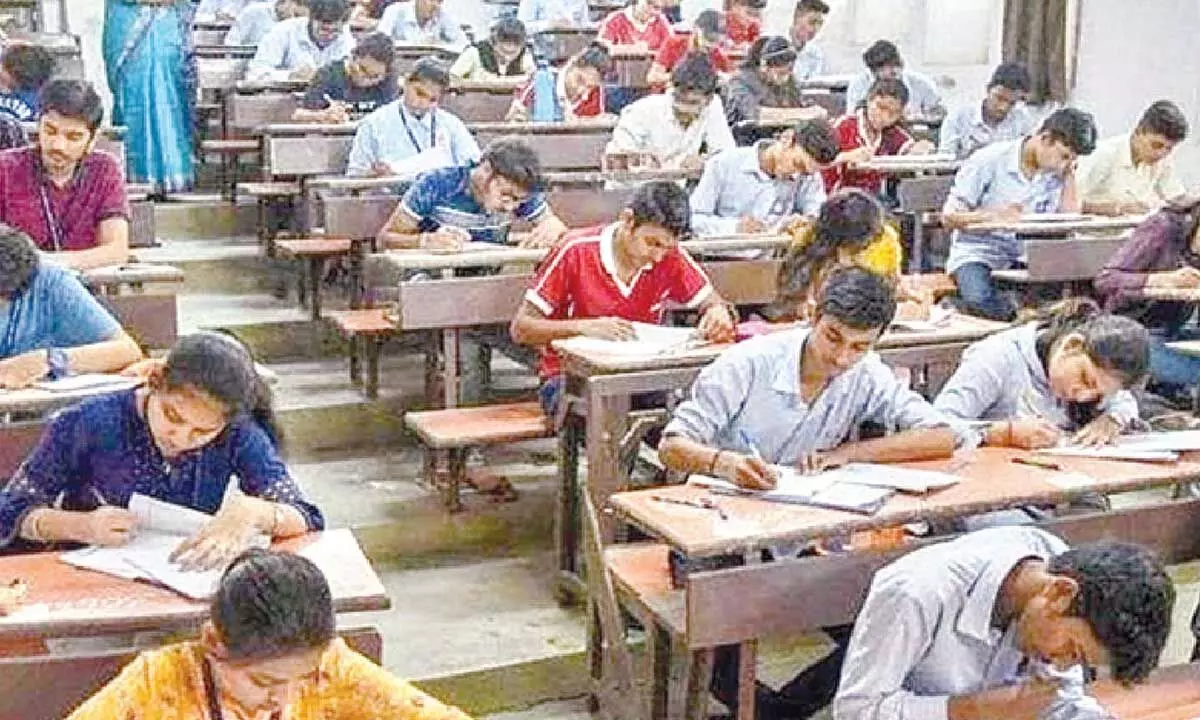The Karnataka government’s ambitious “study abroad” initiative has attracted over 5,000 students in a short span, reflecting a growing desire among young people to seek global opportunities. The program, designed to provide financial and logistical support for overseas education, aims to equip students with advanced skills and international exposure. Officials state that the response has exceeded expectations, signaling both the aspirational nature of Karnataka’s youth and the faith in government schemes. For many applicants, this initiative represents a life-changing opportunity, bridging financial barriers and creating pathways for careers that extend beyond national borders.
The surge of over 5,000 applicants has also put unexpected pressure on the state’s administrative machinery. Officials handling the process admit that verifying documents, conducting background checks, and assessing merit within deadlines has been challenging. With limited staff available for such a large number of candidates, concerns over delays have arisen. Some students have already begun voicing fears that bureaucratic red tape may derail their chances of joining courses abroad in time. The government, in response, has assured that additional staff and digital processing tools will be deployed to fast-track the evaluation process and ensure fairness in shortlisting.
Beyond the numbers, the initiative is also sparking debates on inclusivity. While a significant portion of applicants come from urban centers such as Bengaluru, Mysuru, and Mangaluru, rural representation remains relatively limited. Critics argue that students from smaller towns and villages often lack access to information and resources needed to apply successfully. Many rural parents are unaware of documentation or scholarship requirements, leaving their children at a disadvantage. Activists have urged the government to conduct targeted awareness campaigns in remote districts to ensure that rural talent is not sidelined in the race for international opportunities.
The financial model of the scheme has drawn considerable attention. Under the program, the government provides tuition fee assistance, travel support, and stipends, but only within specified limits. Some experts worry that the capped financial aid may not fully cover the expenses of high-cost destinations like the United States or the United Kingdom. This could leave students dependent on loans, increasing financial stress. In response, the government has hinted at negotiations with partner universities to secure fee waivers and scholarships, thereby reducing the overall financial burden on participating students.
Parents of applicants remain both excited and anxious about the scheme. While they welcome the idea of their children gaining international exposure, they fear challenges related to safety, cultural shock, and adjustment abroad. Many express concerns about how their children will cope with loneliness, high-pressure academic settings, and unfamiliar food or climate. To address these concerns, the government has announced pre-departure orientation programs, where students will receive training on cultural adaptation, financial planning, and mental health awareness. Authorities hope such measures will ease parental concerns while preparing students for the realities of studying and living overseas.
The corporate sector has also shown interest in the scheme, seeing it as a potential pipeline for globally trained professionals who can contribute to industries back home. Technology firms, healthcare companies, and research organizations have welcomed the government’s move, suggesting that returning graduates could fill high-demand roles. However, they also warn that unless the job market in Karnataka evolves to match international skills, many graduates may choose to remain abroad. To counter this, the government is exploring industry partnerships to create fellowships, internships, and priority hiring slots for students who return after completing their education abroad.
Politically, the initiative has become a rallying point for the ruling party, which is projecting it as a flagship youth empowerment program. Leaders emphasize that the scheme embodies the state’s vision of a knowledge-driven economy. Opposition leaders, however, remain unconvinced, claiming that it is a cosmetic policy aimed at earning political mileage rather than delivering structural change. They highlight poor conditions in government schools, teacher shortages, and lack of infrastructure as more pressing issues. The political sparring has intensified, with both sides attempting to frame the scheme as either a revolutionary step forward or a misplaced expenditure.
Background
The scheme was launched with the objective of supporting meritorious students from diverse backgrounds, particularly those unable to afford foreign education. Covering tuition assistance, visa support, and counseling services, it reflects the state’s recognition of global competitiveness in education and employment. Historically, only a fraction of Karnataka’s students pursued studies abroad, with financial constraints acting as the biggest hurdle. By addressing these challenges, the initiative aims not only to empower individuals but also to strengthen Karnataka’s global academic footprint. With over 5,000 applicants, the scheme’s popularity underscores the demand for such opportunities.

Stakeholder Views
Students have welcomed the program with enthusiasm, calling it a gateway to dream institutions. Many first-generation learners see it as a chance to elevate their families’ economic and social standing. Parents, while hopeful, express concerns over cultural adaptation and safety abroad. Academic experts praise the initiative as progressive but emphasize the need for careful student counseling to avoid debt traps and exploitative institutions. Meanwhile, opposition leaders question whether the scheme primarily benefits the privileged rather than marginalized groups. Civil society voices urge transparent selection processes to ensure equitable access for deserving candidates from rural and underprivileged areas.
Legal/Political Context
Politically, the initiative comes at a time when education has become a defining theme in state governance. The ruling party has projected it as evidence of its commitment to youth empowerment, linking it to larger narratives of skill development and employment generation. Opposition parties, however, argue that funds would be better spent improving infrastructure in government schools and colleges within Karnataka itself. They warn that overseas education may create a brain-drain effect, with talented students choosing to settle abroad permanently. This debate highlights the balance governments must strike between global exposure and strengthening local institutions.
Economic and Social Impact
If implemented successfully, the study abroad scheme could have a transformative effect on Karnataka’s economy and society. Students returning with international expertise are expected to contribute to advanced industries such as technology, healthcare, and research. The scheme could also boost Karnataka’s image as a state investing in global-ready citizens. However, experts caution that the benefits will only materialize if returning students find meaningful opportunities within India. Otherwise, the program risks subsidizing talent migration. Ensuring job creation and industry partnerships in Karnataka will therefore be critical to maximizing the scheme’s long-term social value.
Current Status
As of now, the government has confirmed that over 5,000 students have registered interest, with counseling sessions underway to guide them on course selection, financial planning, and visa processes. Officials claim that demand is particularly high in fields like engineering, management, data science, and healthcare. The first batch of selected candidates is expected to begin overseas programs by the next academic cycle. Authorities are also in talks with international universities to streamline admission processes. Meanwhile, monitoring committees have been set up to ensure transparency in disbursal of funds and equitable representation of marginalized communities.

Expert Opinions
Education experts view the surge in applications as a positive sign of Karnataka’s youth engaging with global education trends. They argue that exposure to advanced academic environments will create a generation of globally competent professionals. However, they caution against overemphasis on foreign degrees, stressing the need to improve local institutions so that students also consider Karnataka universities as world-class options. Economists highlight the potential of remittances and knowledge transfer from returning graduates. Policy analysts recommend safeguards to ensure that students are not exploited by foreign institutions offering low-quality courses disguised as premium opportunities.
Timeline
The scheme was conceptualized in 2023 as part of the state’s education and skill development roadmap. Initial planning focused on identifying priority countries and universities. By early 2024, the government finalized policy guidelines and funding allocations, officially launching the program mid-year. Counseling camps and awareness drives were organized across districts, drawing unprecedented student interest. By 2025, applications surpassed 5,000, with shortlisting in progress. The first cohort is expected to begin studies abroad in late 2025 or early 2026. If successful, the scheme could expand further, covering more courses, destinations, and support mechanisms in subsequent phases.
Conclusion
Karnataka’s “study abroad” initiative represents a bold experiment in democratizing access to global education. By drawing over 5,000 students, it has tapped into the deep aspirations of youth eager to compete internationally. Yet, its long-term success will depend on striking a balance between enabling global exposure and preventing brain drain. Transparent implementation, equitable selection, and alignment with Karnataka’s developmental needs will be vital. Whether celebrated as a transformative investment in the future or criticized as a politically driven scheme, the initiative has undeniably reshaped conversations around education and opportunity in Karnataka’s evolving landscape.

The international dimension of the initiative has also begun to unfold. Several foreign universities have reportedly reached out to the Karnataka government, offering collaborations, reduced fee structures, and exclusive programs for selected students. Countries like Canada, Germany, and Australia have shown particular interest in hosting students under the scheme. Such partnerships are expected to ease admissions while also boosting Karnataka’s global reputation as an education hub. Observers believe that if these partnerships succeed, they could serve as a model for other Indian states considering similar overseas education schemes in the future.
Follow: Karnataka Government
Also read: Home | Channel 6 Network – Latest News, Breaking Updates: Politics, Business, Tech & More

